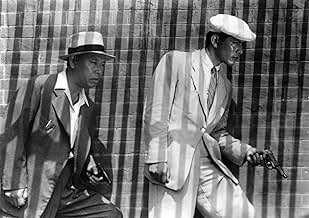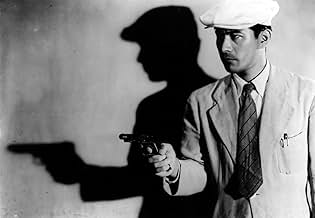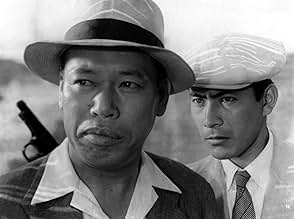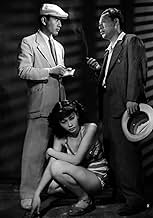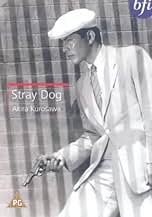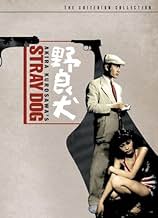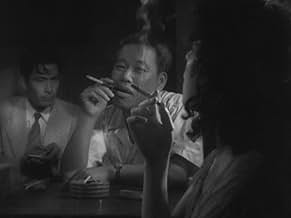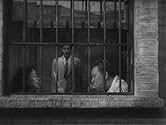During a sweltering summer, a rookie homicide detective seeks advice from a seasoned colleague while trying to track down his stolen Colt pistol.During a sweltering summer, a rookie homicide detective seeks advice from a seasoned colleague while trying to track down his stolen Colt pistol.During a sweltering summer, a rookie homicide detective seeks advice from a seasoned colleague while trying to track down his stolen Colt pistol.
- Director
- Writers
- Stars
- Awards
- 4 wins total
- Director
- Writers
- All cast & crew
- Production, box office & more at IMDbPro
Featured reviews
In ravished, Post-War Tokyo, rookie Detective Murakami's (Young Toshiro Mifune) gun is stolen. Being the crippling times, guns are tough to come by. Soon, victims are found, slain with bullets from Mifune's gun. The man-hunt is on, while Tokyo goes through a devastating heatwave, and Mifune goes through an equally devastating change ("A Stray Dog sees only what it chases" a detective warns him.) Made well before Akira Kurosawa became famous for "Rashomon", "Stray Dog" is a roaring classic! Every character's movement reflects either the horrid heatwave, or the living conditions. It is ironic that a downpour (Kurosawa's favorite on-screen weather condition) breaks the heat just as the tensions in the film mount. How "Bicycle Thief" reflected the times of post war Italy, this classic does the same for post war Japan.
Captivating American-esque noir, one of Kurosawa's first great films. What seems like a weak premise for a thriller at the start actually ends up providing a great central situation for this movie which drives it forward much better than, say, Donzoko. Music, also is great.
Toshiro Mifune, looking young and handsome, is quite marvellous as the central character, a detective whose gun is stolen on a bus. What starts out as a detective nervous about finding his gun and fixing a silly mistake, develops into a frantic and desparate man who feels somehow responsible for whatever crimes are committed with his gun. The suspense and detective-story plot are well developed in Stray Dog, but what really makes the story captivating is the revelation of the central character's feeling of guilt throughout, and his learning about crime, criminals, and that what is important is to make good come of your mistakes.
Toshiro Mifune, looking young and handsome, is quite marvellous as the central character, a detective whose gun is stolen on a bus. What starts out as a detective nervous about finding his gun and fixing a silly mistake, develops into a frantic and desparate man who feels somehow responsible for whatever crimes are committed with his gun. The suspense and detective-story plot are well developed in Stray Dog, but what really makes the story captivating is the revelation of the central character's feeling of guilt throughout, and his learning about crime, criminals, and that what is important is to make good come of your mistakes.
10davidals
STRAY DOG stands as the legendary Akira Kurosawa's first real masterpiece, noteworthy for at least two big reasons: the style - classic American film noir (rich, velvety b&w atmospheres), enhanced with a touch of Italian neo-realism (great use of diverse locations, which provide a great view of day-to-day postwar Japan), and the star, a young Toshiro Mifune, whose truly collaborative association with Kurosawa was cemented here, and would grow in spectacular fashion during the subsequent 16 years.
Mifune became as much of an international icon as Kurosawa, and this is the first film where it's easily evident why. As an example of film noir, STRAY DOG offers plenty of gripping suspense and moral complexity, and holds up well alongside classics like THE BIG HEAT, THE KILLING or THE MALTESE FALCON. Kurosawa touched upon international influences to an unprecedented degree in Japanese film (the internationalist impulses of Ozu, Kenji Mizoguchi or Mikio Naruse are just as deep and varied, but far more discreetly deployed), Kurosawa also skillfully highlights Japanese specifics (the rookie cop expecting to be fired, even accepting the possibility in an apologetic fashion, only to be assured that he will not be fired - this would not occur in a similar American setting), while always linking the same details to universals: honor, nobility, responsibility. This would become the thread linking Kurosawa's celebrated period/samurai films to his contemporary dramas. STRAY DOG was perhaps the first of his films where it truly resonates in a global fashion - a timeless, classic film.
Mifune became as much of an international icon as Kurosawa, and this is the first film where it's easily evident why. As an example of film noir, STRAY DOG offers plenty of gripping suspense and moral complexity, and holds up well alongside classics like THE BIG HEAT, THE KILLING or THE MALTESE FALCON. Kurosawa touched upon international influences to an unprecedented degree in Japanese film (the internationalist impulses of Ozu, Kenji Mizoguchi or Mikio Naruse are just as deep and varied, but far more discreetly deployed), Kurosawa also skillfully highlights Japanese specifics (the rookie cop expecting to be fired, even accepting the possibility in an apologetic fashion, only to be assured that he will not be fired - this would not occur in a similar American setting), while always linking the same details to universals: honor, nobility, responsibility. This would become the thread linking Kurosawa's celebrated period/samurai films to his contemporary dramas. STRAY DOG was perhaps the first of his films where it truly resonates in a global fashion - a timeless, classic film.
This early Kurosawa film interested me not only as a historical object, but because, as in every one of his films I've seen so far, the moral and philosophical implication of the story carries as much weight as the dramatic and poetic aspects. As another commenter said here, "When was the last time you saw a film where the central character had something called a moral imperative." To me it's extremely gratifying to find directors like Kurosawa, Bergman, and today's Hirokazu Kore-eda who treat moral themes seriously and with dignity, and don't shy away from difficult questions.
I was also intrigued by how almost every scene bears, already, the stamp of Kurosawa's unique vision as a director. I have no idea how this comes about, but there's just something there, almost like a fingerprint, that says "Kurosawa" unmistakeably. I would have to leave it to more gifted and better schooled viewers than myself to explain it, but I love seeing it. In part, I suppose it's due to the exceptionally fine cinematographers that Kurosawa habitually worked with.
I think the film is about thirty minutes too long, but if I have to see a film that's a bit too long, I'm at least glad it's by Kurosawa!
I was also intrigued by how almost every scene bears, already, the stamp of Kurosawa's unique vision as a director. I have no idea how this comes about, but there's just something there, almost like a fingerprint, that says "Kurosawa" unmistakeably. I would have to leave it to more gifted and better schooled viewers than myself to explain it, but I love seeing it. In part, I suppose it's due to the exceptionally fine cinematographers that Kurosawa habitually worked with.
I think the film is about thirty minutes too long, but if I have to see a film that's a bit too long, I'm at least glad it's by Kurosawa!
Impressive as some of the later films of Kurosawa are - "Kagemusha" and "Ran" for example, I have to confess that it is his early work, particularly those set in modern Japan as opposed to its feudal past, that I find myself returning to with greater pleasure. He was not one of those artists who necessarily got better and better, rather was he one who continued to take on different challenges, not always with the same degree of success, as "Dodesukaden" and "Dreams" were to prove. I have long regarded the 1952 "Ikiru" as his greatest achievement, with the three modern day day films starring Toshiro Mifune that precede it, "Drunken Angel", "The Quiet Duel" and "Stray Dog", fascinating consolidations of his skill as a director. "Stray Dog" revels in technical accomplishment. It tells the story of a policeman who, after experiencing the theft of his gun while travelling on a bus, embarks on an odyssey to retrieve it. Questions of morality and honour loom large as they do in any Kurosawa film, with the quest becoming ever more urgent as evidence is gathered of the weapon being used in criminal activities. What might be regarded as plain bad luck in another culture is here seen as a matter of shame and dishonour by the unfortunate policeman, that has to be addressed forsaking all else. The search is pursued in a dazzling series of chases, encounters and interrogations that leaves the audience, like the hero, exhausted at times. The weather is hot throughout, characters sweat profusely and sometimes everything erupts in a tropical downpour - no other director uses rain so physically. Perhaps, at over two hours, "Stray Dog" is a little too long to sustain its material. It sags a little in the middle, but the chases at the outer ends of the film are wonderfully done, particularly the penultimate sequence where the cop pursues his prey through vegetation where city and countryside meet. You can almost smell the steamy atmosphere of a morning after rain where everything is about to heat up again. Possibly the other two Mifune films of the same period have the edge on this. They are more meditative works, their lengths more sustainable. But, for sheer cinematic bravado, this is the one.
Did you know
- TriviaMuch of the film was filmed from the slum streets of post war Japan. These were filmed under chief assistant director Ishirô Honda, who had gone with camera operator Kazuo Yamada into some dangerous, even yakuza run, territory. Many of the scenes of Toshirô Mifune's character from the waist down are actually Honda standing in. In his book, Something Like an Autobiography, Akira Kurosawa described Honda's role stating, "I had Honda do mainly second-unit shooting. Everyday I told what I wanted and he would go out into the ruins of postwar Tokyo to film. There are few men as honest and reliable as Honda. He faithfully brought back exactly the footage I requested, so almost everything he shot was used in the final cut of the film. I'm often told that I captured the atmosphere of postwar Japan very well in Stray Dog, and if so I owe a great deal of that success to Honda."
- GoofsIn one scene, the looped first half of the popular waltz "Waves of the Danube" is heard, played on accordion, while on screen a man appears to play harmonica.
- Quotes
Police Inspector Nakajima: Bad luck either makes a man or destroys him. Are you gonna let it destroy you? Depending how you take it, bad luck can be a big break.
- ConnectionsFeatured in Kurosawa Akira: Tsukuru to iu koto wa subarashii: Stray Dog (2002)
- SoundtracksThe Waves of the Danube
(uncredited)
Composed by Iosif Ivanovici
[Played on a harmonica outside the bar when Murakami follows Ogin]
- How long is Stray Dog?Powered by Alexa
Details
- Release date
- Country of origin
- Languages
- Also known as
- Pas lutalica
- Filming locations
- Ameya Yokocho market, Ueno, Tokyo, Japan(black market scenes)
- Production companies
- See more company credits at IMDbPro
Box office
- Gross US & Canada
- $46,808
- Opening weekend US & Canada
- $15,942
- Jul 28, 2002
- Gross worldwide
- $47,023
- Runtime
- 2h 2m(122 min)
- Color
- Sound mix
- Aspect ratio
- 1.37 : 1
Contribute to this page
Suggest an edit or add missing content


